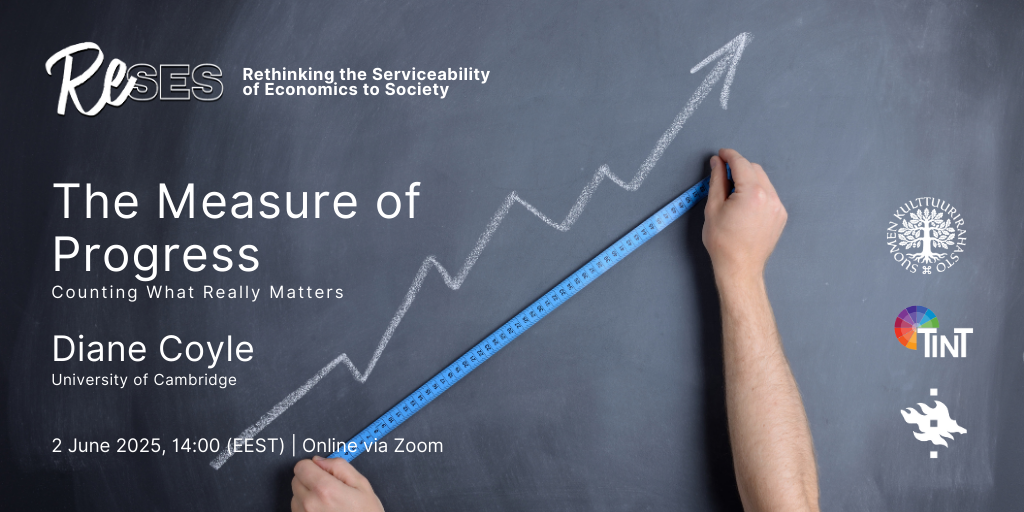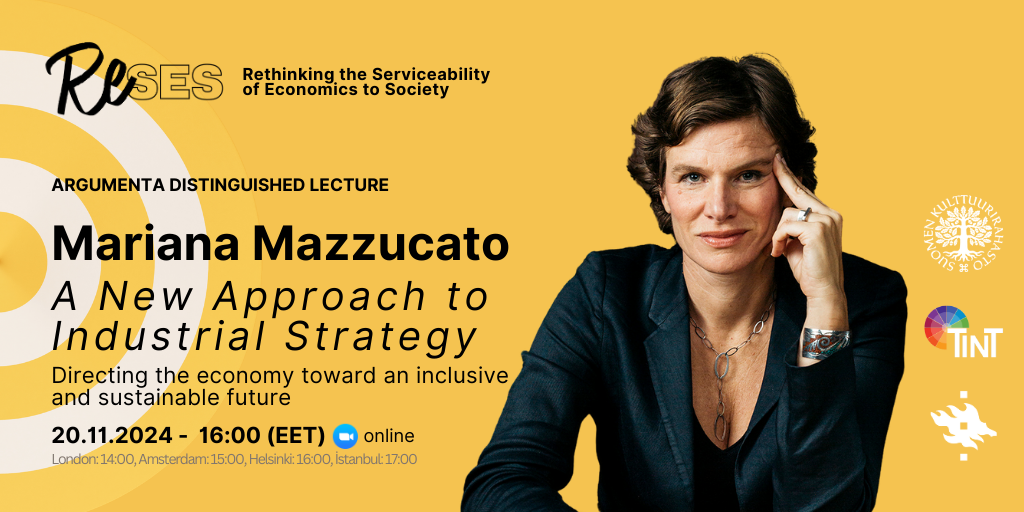Economics professor Ha-Joon Chang visited Helsinki in the summer of 2023 to give a lecture in which he presented his new book aimed at the general public, Edible Economics: A Hungry Economist Explains the World. In the book, he uses food-related anecdotes as a bridge to entice readers into exploring economic ideas.
Within economics, Chang is quite a contrarian. While many consider certain uniformity and consensus as scientific achievements and signs of progress in economics, Chang views this development as unfortunate and believes economics has become an unreasonably one-sided discipline. The history of economics includes numerous theoretical approaches or schools of thought that once had a major position within the discipline but have become marginalized or virtually extinct. In his lecture, Chang mentioned Marxist, Schumpeterian, and Austrian economics as examples of such schools. Such advocacy for diversity is called pluralism.
Furthermore, Chang is a maverick when it comes to views on the role of economics in politics. While many economists would like to see economic research carry more weight in policymaking—after all, shouldn’t economic decisions be informed by research and evidence?—Chang rather wants to limit economists’ influence. He wants citizens to understand economics so they won’t blindly accept all claims and policy recommendations made by economists. In his view, democracy requires limiting economists’ authority.
I interviewed Chang about his views on pluralism and democracy. The full interview has been published in the Erasmus Journal for Philosophy and Economics (Chang & Lari 2024). In this blog post, I summarize some of the key points of our discussion.
Plurality of perspectives
What does Chang mean by pluralism? Pluralism takes different forms depending on what kind of diversity is being advocated. Economics uses many different theoretical and empirical models, and I asked Chang what he thinks about “model pluralism,” which economist Dani Rodrik (2015), for example, has advocated for. Chang emphasized that he believes fundamental theoretical starting points should be diverse. Although mainstream economics today encompasses different approaches—alongside neoclassical economics, there’s behavioral and institutional economics, as well as empirical economics which often isn’t thought to belong to any particular school—Chang believes these directions still share the same foundations with neoclassical economics. Therefore, the diversity remains superficial.
An essential background to Chang’s pluralism is that he defines economics as the science of the economy, that is, a science whose task is to investigate how goods and services are produced, exchanged, consumed, and also wasted. This might sound obvious, but this view isn’t widely shared among economists. Economics is often defined by referring to certain methodological, theoretical, and/or conceptual starting points. In this view, economics is a discipline centered on scientific modeling of human behavior, utilizing the concept of equilibrium in modeling, and assumptions about the goal-centered nature of human action. Economists can use this perspective to study various phenomena including, but not limited to, economic phenomena.
When economics isn’t definitionally tied to specific research commitments, this opens up the possibility to study the economy using multiple frameworks. In Chang’s thinking, schools of thought outside mainstream economics are precisely such alternative frameworks.
Critiques and replies
However, in our discussion, it remained somewhat unclear to me through what kind of reasoning Chang moves from the possibility of alternative approaches to their necessity. And not just necessity in general, but necessity specifically within economics. It’s undisputable that the economy can be studied through various approaches, but this doesn’t directly imply that economics should study the economy through various approaches. This logical leap is not a peculiarity of Chang’s reasoning; it also appears repeatedly in the broader research literature on pluralism.
Chang noted that different approaches have their own strengths and weaknesses. One can ask many kinds of questions about the economy, only some of which can be satisfactorily answered using the concepts and methods employed in mainstream economics. We discussed the study of power. There are many types of power, and bargaining power which appears in economic research is just one of them. Chang emphasized that influencing people’s thoughts, values, and opinions is a significant form of exercising power. The starting point familiar from neoclassical theory of taking people’s desires and values (preferences) as given doesn’t provide tools for understanding this type of power. From neoclassical theory’s individualistic foundations, it’s also not easy to examine the concept of social class and class-related questions.
The fact that different approaches have their strengths and weaknesses means they are value-laden. Different questions matter to different interest groups, so the choice of approach affects which groups the knowledge produced serves.
I presented Chang with some counter-arguments based on my own research (Lari, 2024a, 2024b; Lari & Mäki, 2024). First, while diversity is beneficial in many ways, uniformity in research also has its advantages. The fact that researchers in a discipline share conceptual, methodological, and theoretical starting points benefits cooperation and discussion between researchers. Common ground reduces misinterpretations and helps in evaluating others’ claims.
Economists have also opposed excessive diversity with the public image of economics in mind. Differences in the starting points of research easily lead to differences in conclusions. Such disagreements might be interpreted as a sign of the discipline’s weak scientific quality. The impression of scientificity may require some degree of unanimity, and if that impression suffers, influence and research funding might be threatened. This issue has been highlighted by, for example, Jean Tirole, who won the Nobel Prize in Economics in 2014. “If there were no majority opinion, financing research in economics would be hard to justify” (Tirole 2017, 75).
These arguments received no sympathy. Chang considered both concerns completely unfounded. The concern about smooth communication, in his view, underestimates both students’ and researchers’ intelligence and their ability to adopt new perspectives. As for the public image of economics, there’s no reason to protect it with an artificial façade of consensus. If what Chang calls neoclassical economics is worth funding, the general public will understand that, despite the plurality of perspectives. If it is not, too bad for neoclassical economics.
In my opinion, both of his responses reveal a striking level of optimism. The challenges of interdisciplinarity have been discussed by researchers as long as interdisciplinarity has existed. Multi-perspectival research hardly becomes any easier just because it is done within a single discipline. It is worth remembering that many economic approaches, which are now considered distinct schools of thought, originally diverged from the mainstream of economics precisely because fundamental differences in perspective led to unresolved disputes. Post-Keynesianism is a good example of this. From the 1950s to the 1970s, economists from prestigious universities (Cambridge and MIT) engaged in the so-called ”capital controversies”, during which the parties faced insurmountable difficulties in making their perspectives comprehensible to each other (see, e.g., Cohen & Harcourt, 2003). As a result, the theoretical approach now known as Post-Keynesianism separated from the mainstream of economics.
Chang has remarkable confidence in the general public’s ability to evaluate and appreciate research. He seems to believe that plurality and discord within a discipline cannot threaten public trust in science or the authority of scientific knowledge. However, scholars of science studies have repeatedly highlighted scientists’ concerns about how disagreements appear to outsiders, including citizens and other disciplines (e.g., Beatty, 2006; Goodwin, 1998). Strong optimism regarding public trust in pluralistic research is particularly thought-provoking in an era when anonymous social media accounts challenge research projects based solely on headlines and public summaries, singling out for criticism those that fail to align with preconceived folk notions of quality research.
The question of what kind of pluralism is warranted in economics thus wasn’t resolved in this discussion either. Nevertheless, it’s important that pluralism is discussed and that specifically researchers who know their field well engage in informed discussion about it. Professor Chang’s activisim is commendable in this regard. The self-correcting nature of science is based on critical discussion. That discussion must concern not only research results but also the institutional structures within which research is conducted, including how those structures encourage or suppress non-mainstream ideas.
Teemu Lari holds a Doctor of Social Sciences degree from the University of Helsinki and is a working group member in the Rethinking the Serviceability of Economics to Society (ReSES) project, which invited Chang to Helsinki. His doctoral dissertation examined pluralism in economics. He is currently a postdoctoral fellow at Leibniz University Hannover, in the SOCRATES Centre for Advanced Studies.
This is a slightly modified translation of an earlier post in Finnish. AI tools were used in the translation.
References
Beatty, J. (2006). Masking Disagreement among Experts. Episteme, 3(1–2), 52–67. https://doi.org/10.3366/epi.2006.3.1-2.52 
Chang, H.-J. (2022). Edible Economics: A Hungry Economist Explains the World. Allen Lane.
Chang, H.-J., & Lari, T. (2024). Economics, Pluralism and Democracy: An Interview with Ha-Joon Chang. Erasmus Journal for Philosophy and Economics, 17(2). https://doi.org/10.23941/ejpe.v17i2.920 
Cohen, A. J., & Harcourt, G. C. (2003). Retrospectives: Whatever happened to the Cambridge capital theory controversies? Journal of Economic Perspectives, 17(1), 199–214. https://doi.org/10.1257/089533003321165010 
Goodwin, C. D. (1998). The patrons of economics in a time of transformation. In M. S. Morgan & M. Rutherford (Eds.), From Interwar Pluralism to Postwar Neoclassicism (pp. 53–81). Duke University Press.
Lari, T. (2024a). Diversity for the Common Good? Philosophical Inquiries into Pluralism in Economics [Doctoral dissertation, University of Helsinki]. http://urn.fi/URN:ISBN:978-952-84-0211-4 
Lari, T. (2024b). What counts as relevant criticism? Longino’s critical contextual empiricism and the feminist criticism of mainstream economics. Studies in History and Philosophy of Science, 104, 88–97. https://doi.org/10.1016/j.shpsa.2024.02.005
Lari, T., & Mäki, U. (2024). Costs and Benefits of Diverse Plurality in Economics. Philosophy of the Social Sciences, 54(5), 412–441. https://doi.org/10.1177/00483931241255230
Rodrik, D. (2015). Economics Rules: The Rights and Wrongs of the Dismal Science. W. W. Norton.
Tirole, J. (2017). Economics for the Common Good. Princeton University Press.


